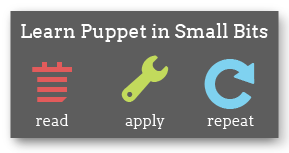Exported Resource Design Patterns
Exporting and collecting resources is an extension of Virtual Resources . Puppet provides an experimental superset of virtual resources, using a similar syntax. In addition to these resources being virtual, they’re also “exported” to other hosts on your network.
About Exported Resources
While virtual resources can only be collected by the host that specified them, exported resources can be collected by any host. You must set the storeconfigs setting to true to enable this functionality (you can see information about stored configuration on the Using Stored Configuration wiki page, and Puppet will automatically create a database for storing configurations (using Ruby on Rails).
[master]
storeconfigs = true
This allows one host to configure another host; for instance, a host could configure its services using Puppet, and then could export Nagios configurations to monitor those services.
The key syntactical difference between virtual and exported
resources is that the special sigils (@ and <| |>) are doubled (@@
and <<| |>>) when referring to an exported resource.
Here is an example with exported resources:
class ssh {
@@sshkey { $hostname: type => dsa, key => $sshdsakey }
Sshkey <<| |>>
}
As promised, we use two @ sigils here, and the angle brackets are doubled in the collection.
The above code would have every host export its SSH public key, and then collect every host’s key and install it in the ssh_known_hosts file (which is what the sshkey type does); this would include the host doing the exporting.
It’s important to mention here that you will only get exported resources from hosts whose configurations have been compiled. If hostB exports a resource but hostB has never connected to the server, then no host will get that exported resource. The act of compiling a given host’s configuration puts the resources into the database, and only resources in the database are available for collection.
Let’s look at another example, this time using a File resource:
node a {
@@file { "/tmp/foo": content => "fjskfjs\n", tag => "foofile", }
}
node b {
File <<| tag == 'foofile' |>>
}
This will create /tmp/foo on node b. Note that the tag is not required, it just allows you to control which resources you want to import.
Exported Resources with Nagios
Puppet includes native types for managing Nagios configuration files. These types become very powerful when you export and collect them. For example, you could create a class for something like Apache that adds a service definition on your Nagios host, automatically monitoring the web server:
class nagios-target {
@@nagios_host { $fqdn:
ensure => present,
alias => $hostname,
address => $ipaddress,
use => "generic-host",
}
@@nagios_service { "check_ping_${hostname}":
check_command => "check_ping!100.0,20%!500.0,60%",
use => "generic-service",
host_name => "$fqdn",
notification_period => "24x7",
service_description => "${hostname}_check_ping"
}
}
class nagios-monitor {
package { [ nagios, nagios-plugins ]: ensure => installed, }
service { nagios:
ensure => running,
enable => true,
#subscribe => File[$nagios_cfgdir],
require => Package[nagios],
}
# collect resources and populate /etc/nagios/nagios_*.cfg
Nagios_host <<||>>
Nagios_service <<||>>
}
Exported Resources Override
Beginning in version 0.25, some new syntax has been introduced that allows creation of collections of any resources, not just virtual ones, based on filter conditions, and override of attributes in the created collection. This feature is not constrained to the override in inherited context, as is the case in the usual resource override.
Ordinary resource collections can now be defined by filter conditions, in the same way as collections of virtual or exported resources. For example:
file {
"/tmp/testing": content => "whatever"
}
File<| |> {
mode => 0600
}
The filter condition goes in the middle of the <| |> sigils. In
the above example the condition is empty, so all file resources
(not just virtual ones) are selected, and all file resources will
have their modes overridden to 0600.
In the past this syntax only collected virtual resources. It now collects all matching resources, virtual or no, and allows you to override attributes in any of the collection so defined.
As another example, one can write:
file { "/tmp/a": content => "a" }
file { "/tmp/b": content => "b" }
File <| title != "/tmp/b" |> {
require => File["/tmp/b"]
}
This means that every File resource requires /tmp/b, except /tmp/b itself. Moreover, it is now possible to define resource overriding without respecting the override on inheritance rule:
class a {
file {
"/tmp/testing": content => "whatever"
}
}
class b {
include a
File<| |> {
mode => 0600
}
}
include b

